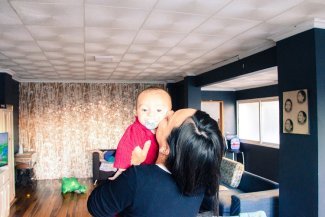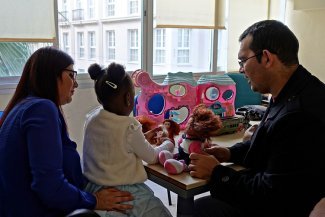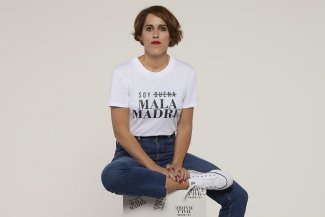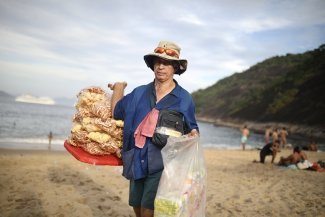
Scene from Lola Arias’ latest play "Mother Tongue", which tells the real-life stories of migrant, adoptive, trans, in vitro, lesbian mothers, and those who raise their children alone, in a couple or as part of a community.
The curtain opens and the stage is almost bare. There is a chest of drawers, a carpet and, on it, a woman holding a bundle tucked away in a blanket. “From seven in the morning to two in the afternoon, I had only dilated by three centimetres. And you couldn’t get through there,” says the woman, addressing the small figure she seems to be holding in her arms, her newborn baby.
So begins Mamífera, a play by Argentinian director Sol Bonelli, and although only a few minutes have gone by, we already know that it is not going to be the typical story about motherhood, that there will be no placatory words or sugar-coated scenes. “Motherhood is a pool of cold water,” says the actress, the mother. “You’re there, touching it with the tip of your toe, waiting for it to warm up, who knows how?
It all rings true in Mamífera, because it is. It is a portrayal of Bonelli’s own experience, the raw account of her two caesarean sections. “It was an internal wound I was carrying,” she tells Equal Times. “After giving birth, if you say you’re not feeling good, you seem ungrateful. It’s like a diktat; you have a child, it’s alive; you don’t complain about anything, you have to be happy.” But it is not always the case, which is why the director wanted to talk about it, “to shine a light on the B-side of motherhood that no one wants to listen to or is difficult for people to hear”.
Sol Bonelli wrote the monologue in 2016. Back then, she acknowledges, there were not many books, films – much less plays – that spoke about the experience of being a mother in this way. Things have evolved, however, she says, “especially with the push from feminist movements to talk about these issues.”
The subject of motherhood in culture is nothing new: films, theatre and literature are full of stories about mothers, are they not? “Those who have been missing are women,” says Amparo Moreno, psychologist and lecturer on the Gender Studies master’s programme at the Autonomous University of Madrid (UAM), “The voices of women, those who are mothers and those who are not.”
The presence of more female authors, directors, screenwriters, playwrights (the number of female directors has doubled in Hollywood since 1998, for example, and 17 per cent of the most watched films in 2021 were directed by women) is transforming the single, idealised narrative about mothers that has long dominated popular culture.
Neither saints nor devils
Told from a male perspective for centuries, the story of motherhood has been a minefield of stereotypes. Most of the narratives in cinema, literature and television have basically depicted two types of mother: saintly or evil, self-sacrificing or emasculating, good or bad.
In the world of cinema, this can be seen in genres such as drama – Mildred Pierce (1945), Not Without My Daughter (1990) or even disaster films, such as The Impossible (2012) – where mothers, “are not heroines because of their strength but their ability to suffer.” Then, at the opposite end of the spectrum, are the evil mothers depicted by the horror genre – Psycho (1960), Carrie (1976). Asunción Bernárdez, professor of journalism and new media at Universidad Complutense de Madrid, offered the following analysis in 2017: “This dichotomy – between sacrificing mothers and ‘venomous spiders’ – is highly negative, as it locks women into claustrophobic models that create anxiety and insecurity.”
“The vision of motherhood we have grown up with is artificial,” says Ana Álvarez-Errecalde. This artist has spent years photographing breastfeeding mothers or mothers scarred by their caesarean sections. In 2005, she did a self-portrait of herself after giving birth, to challenge the images shown on screen with an image of her naked, bloodstained body attached to her daughter by the umbilical cord. “We have been sold the idea that the desirable thing is a birth where you are handed a baby that is all nice and clean.”
Works like this one, or films such as The Lost Daughter by Maggie Gyllenhaal, Ama by Júlia de Paz, Lullaby by Alauda Ruiz de Azúa, books like A Life’s Work by Rachel Cusk, Linea Nigra (Black Line) by Jazmina Barrera or Mamá Desobediente (Disobedient Mum) by Esther Vivas, are bringing to light new, less flat, more honest stories about childbirth and parenting, stories told from the inside, with all their nuances and contradictions, with their moments of joy and estrangement, love and loneliness.
“All bonds that are meaningful unavoidably have many areas of ambiguity,” says the writer Berta Dávila, whose latest novel, Los seres queridos (Loved Ones), narrates the transformation – not only physical but also in terms of identity – of a woman after becoming a mother. “I didn’t want to write about a character who was a mother and end up talking just about the child. The idea is to talk about her, about the conflict of identity involved in going through such a transformative experience.”
“A new mother is a woman in mourning for that other woman she leaves behind,” says the protagonist of the novel, and her brutal frankness suddenly sheds light on those grey areas denied by the weight of social disapproval.
“It’s liberating to be able to open up about all those experiences swept under the carpet,” says playwright Sol Bonelli. “For many women the silence translates into guilt and depression,” she explains. “In my case, many women hugged me after the performance or cried and told me about their own experiences. It’s not about demonising motherhood but about humanising it.”
The instinct myth
For Alba V. Lasheras, owner of the Librería Mujeres bookshop in Madrid, the boom in stories about motherhood started in 2019 and, since then, the growth has been such that they have had to create a specific section. “What there used to be was more like self-help guides. Now there are more first-hand accounts, both fiction and essays, more critical, more realistic books. At the same time, there has also been an increase in the number of women readers looking for these books. We’re seeing a boom right now,” she explains.
Writers such as Doris Lessing, Alice Munro or Sylvia Plath already addressed the issue in their works. The feeling now is that this is a visible and growing tide connecting a whole host of voices from Europe to the US, Latin America, Africa and Asia – with works such as Breasts and Eggs by Mieko Kawakami or Hôzuki by Aki Shimazaki.
“The Joys of Motherhood by Nigerian-born writer Buchi Emecheta has just been republished,” says Lasheras. The novel, which totally demystifies motherhood, was written in 1979 but is now being recovered, as is the out-of-print classic Of Woman Born by Adrienne Rich, translated and republished in Spanish in 2019.
“Culture is fundamental, it can be revolutionary, to an extent, in that it expresses new ideas, but it is also a reflection of our societies and the changes we are making,” says Professor Moreno. “During this time, certain myths have been called into question. Women now prioritise work or a professional career as life goals, for example, and motherhood takes second place and is postponed.”
“The other myth being fought is that mothers are to blame for all the ills of their children,” she continues. “The big construct still in place is the myth of maternal instinct.”
The psychologist refers to that supposed instinct, already questioned by authors such as Simone de Beauvoir and Elisabeth Badinter, the idea that women – all women – have an innate desire to give birth and care for their children. Motherhood should therefore fill them – all of them – with instant and unparalleled happiness. “The instinct myth plays a key political role, everything is done to persuade us that mothers naturally love and are therefore natural caregivers; that they take pleasure in it,” notes Moreno.
Maternal instinct does not exist in so far as there are women who do not want to have children. An estimated 10 to 20 per cent of European women will not become mothers. Neither will 15 per cent of American women, for example. “Where are they in popular culture?” asks director Laura García who, together with Inés Peris, has directed the documentary [m]otherhood about women who decide not to be mothers and the pressure they still encounter as a result. “If you don’t have children, you feel like you’re flawed, that you’re not complete and the lack of role models doesn’t help. Women that are happy without children are underrepresented in culture, beyond the cat lady or Cruella de Vil.”
[m]otherhood premiered in 2018 and has since been sold to 14 broadcasters, most recently in Japan. “Many women have thanked us for talking about it. They felt stigmatised.” Just as important as talking about motherhood, García argues, is normalising the choice of motherhood as a desire, not a natural mandate. “Women are not all the same.”
Motherhoods in the plural
The traditional family model has for some time been fragmented into a wide range of combinations – single-parent families, same-sex parent families, adoptive families, etc. The right thing to talk about then would not even be motherhood, but motherhoods. Theatre director Lola Arias portrays this reality very clearly in her latest play Mother Tongue, telling the real-life stories of migrant, adoptive, trans, in vitro, lesbian mothers, and those who raise their children alone, in a couple or as part of a community.
“What is normal motherhood?” the work asks, once again vindicating, in contrast to the single narrative, the many different motherhoods, to which the stories could also be added of those who want to be mothers but cannot, Notes to Self by Emilie Pine; those who decide to abort in order not to be mothers, Happening by Annie Ernaux; those prevented from becoming mothers by precarity, El vientre vacío (The Empty Womb) by Noemí López Trujillo; those who are mothers in spite of the precariousness of their situation, Maternidades precarias (Precarious Motherhoods) by Diana Oliver.
In A Life’s Work, writer Rachel Cusk asks whether a book about motherhood is of any real interest to anyone except other mothers. It is a doubt still shared by many authors – will these new voices ever manage to emerge from ‘the feminine’ niche to take their rightful place in mainstream culture?
“Understanding that a novel in which a mother appears is not only for mothers but for all readers is fundamental, in the same way that a novel about robots is not for robots,” says writer Berta Dávila. “We are talking about truly universal and profound experiences in which we all take part, whether as mothers or as children.”












